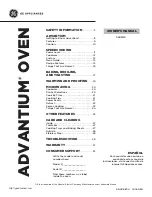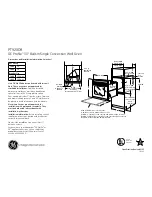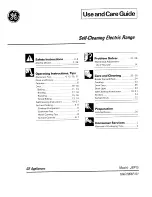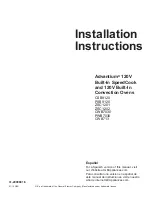
Safety
en
3
▶
Switch off the appliance and unplug it from
the mains or switch off the circuit breaker
in the fuse box.
Loose food remnants, fat and meat juices
may catch fire.
▶
Before using the appliance, remove the
worst of the food residues and remnants
from the cooking compartment, heating ele-
ments and accessories.
Opening the appliance door creates a
draught. Greaseproof paper may come into
contact with the heating element and catch
fire.
▶
Do not place greaseproof paper loosely
over accessories when preheating the ap-
pliance.
▶
Always use a plate or baking tin to hold
greaseproof paper down.
▶
Do not use more greaseproof paper than is
necessary.
▶
Greaseproof paper must not extend over
the edge of accessories.
WARNING ‒ Risk of burns!
The appliance gets very hot.
▶
Never touch the inside surfaces of the
cooking compartment or the heating ele-
ments while they are hot.
▶
Always allow the appliance to cool down.
▶
Keep children at a safe distance.
Accessories and cookware get very hot.
▶
Always use oven gloves to remove ac-
cessories or cookware from the cooking
compartment.
When the cooking compartment is hot, any al-
coholic vapours inside may catch fire.
▶
Never prepare food containing large quant-
ities of liquid with a high alcohol content.
▶
Only use liquid with a high alcohol content
in small quantities.
▶
Open the appliance door carefully.
WARNING ‒ Risk of scalding!
The accessible parts of the appliance become
hot during operation.
▶
Never touch these hot parts.
▶
Keep children at a safe distance.
Hot steam may escape when you open the
appliance door. Whether or not you can see
steam depends on its temperature.
▶
Do not stand too close to the appliance
when opening the door.
▶
Open the appliance door carefully.
▶
Keep children at a safe distance.
If there is water in the cooking compartment
when it is hot, this may create hot steam.
▶
Never pour water into the cooking compart-
ment when the cooking compartment is
hot.
WARNING ‒ Risk of injury!
Scratched glass in the appliance door may
develop into a crack.
▶
Do not use glass scrapers, sharp or abras-
ive cleaning aids, or harsh cleaning
products.
The hinges on the appliance door move when
the door is opened and closed, which could
trap your fingers.
▶
Keep your hands away from the hinges.
Components inside the appliance door may
have sharp edges.
▶
Wear protective gloves.
WARNING ‒ Risk of electric shock!
Incorrect repairs are dangerous.
▶
Repairs to the appliance should only be
carried out by trained specialist staff.
▶
Only use genuine spare parts when repair-
ing the appliance.
▶
If the power cord of this appliance is dam-
aged, it must be replaced by trained spe-
cialist staff.
If the insulation of the power cord is dam-
aged, this is dangerous.
▶
Never let the power cord come into contact
with hot appliance parts or heat sources.
▶
Never let the power cord come into contact
with sharp points or edges.
▶
Never kink, crush or modify the power
cord.
An ingress of moisture can cause an electric
shock.
▶
Do not use steam- or high-pressure clean-
ers to clean the appliance.
If the appliance or the power cord is dam-
aged, this is dangerous.
▶
Never operate a damaged appliance.
▶
Never operate an appliance with a cracked
or fractured surface.
▶
Never pull on the power cord to unplug the
appliance. Always unplug the appliance at
the mains.
▶
If the appliance or the power cord is dam-
aged, immediately unplug the power cord
or switch off the fuse in the fuse box.




































